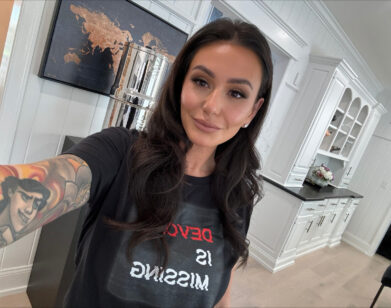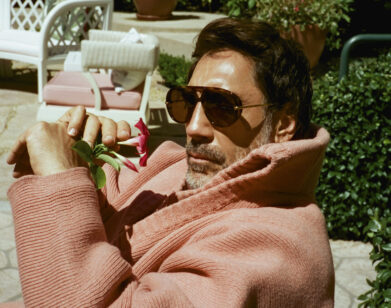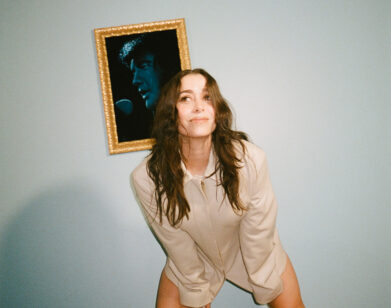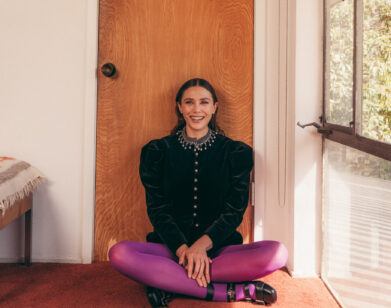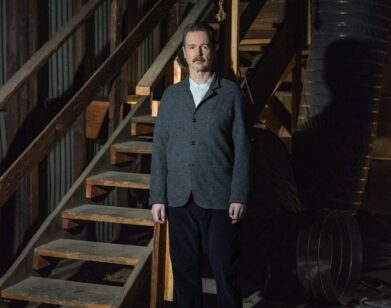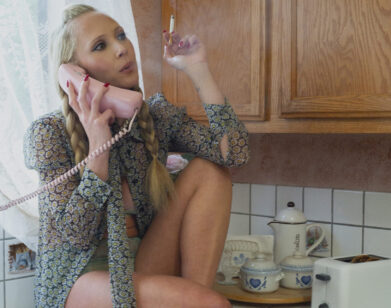Flying High with Gaby Hoffmann
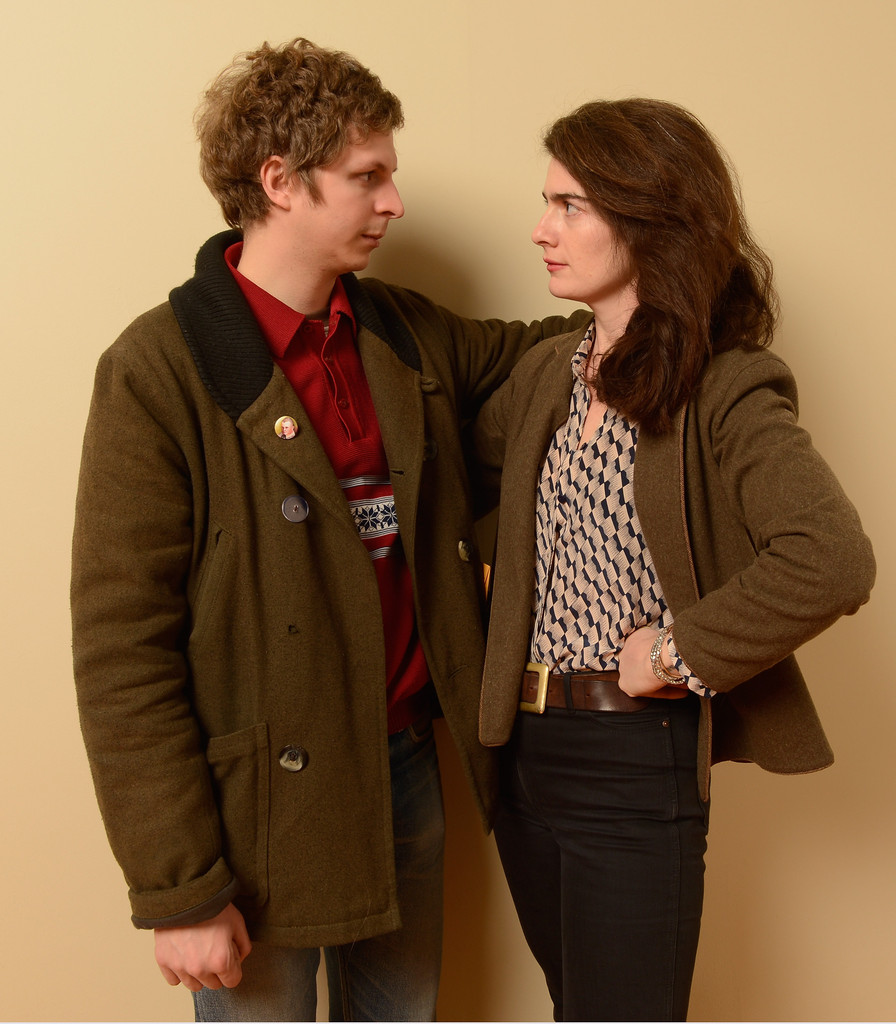
ABOVE: MICHAEL CERA AND GABY HOFFMANN AT SUNDANCE, JANUARY 2013
Two Americans—a 20-something misanthrope and a blissfully nude future cat lady—and three patient and slightly bewildered Chilean brothers travel across Chile together. They are searching for San Pedro: a mescaline-containing cactus that, when boiled and imbibed, results in a mind-altering high.
Last January at Sundance, two strikingly similar films appeared on the program. Both were written and directed by Sebástian Silva, set in Chile, and starred an against-type Michael Cera. The first, Magic Magic, co-starred Juno Temple, the second, Crystal Fairy & The Magical Cactus, featured Silva’s three brothers and his friend Gaby Hoffmann.
Based on director Silva’s personal experience, Crystal Fairy was a semi-spontaneous project. While waiting for production on Magic Magic to begin, Silva convinced his friends and family to help him turn a 12-page outline into a 98-minute film. He succeeded. Hilarious, but never flip, Crystal Fairy won Silva the directing prize in Sundance’s World Dramatic category.
Gaby Hoffmann seems the perfect subject for Interview: the daughter of Warhol star Viva, Hoffmann spent the first 10 years of her life living in the Chelsea Hotel. An actor from the age of seven, she played Natalie Portman‘s twin and Natasha Lyonne‘s half sister in Woody Allen’s Everyone Says I Love You (1996), a young Demi Moore in Now And Then (1995), and starred opposite Kirsten Dunst in the delightful teen comedy All I Wanna Do (1997) (if you’ve ever heard anyone use the phrase, “up your ziggy with a wah-wah brush, that is why). Then, in 2001, Hoffmann retired. We spoke with Hoffmann via phone about transformative trips of the travel and drug variety and her decade of acting uncertainty.
EMMA BROWN: How did you become involved in Crystal Fairy?
HOFFMANN: I had worked with Sebastián [Silva] about a year before on a HBO Go web series called The Boring Life of Jacqueline, which I fought tooth and nail to audition for—that’s not really true, it wasn’t tooth and nail—because I had seen one of his first films The Maid at Sundance and really, really loved it. I had a sort of out-of-body experience watching it. I got asked to audition for a new project in which I needed to be fluent in French, and I wasn’t. Then I found out it was Sebastián’s project, so I lied and said I was. I got in the room and somehow convinced him to hire me without the French. We worked on that in the fall of 2010 and just had a really great time and became good friends. He called me up and said, “Do you wanna to get on a plane to Chile and come figure out how to make a movie with no script in the desert with Michael [Cera] and I?” and I said, “Of course.”
Michael had been in Chile for three months learning Spanish in preparation for Magic Magic, and living with the Silva family— the brothers and Sebástian’s parents. Sebastian was up in Brooklyn the whole time. Then Michael went back to L.A. and it didn’t seem like anyone was coming, so Sebastián said, “Well, why don’t we just do it in the meantime?” So we all flew back down.
BROWN: As Jamie, Michael does a very convincing job of playing a jerk. He’s on a bit of a role with this and his cameo in This Is the End.
HOFFMANN: Yes. I don’t know how he does it; he just has to wake up. No, I’m kidding. He’s the loveliest person in the world. It’s a testament to his good acting.
BROWN: Your character—Crystal Fairy—is quite eccentric. Do you relate to her at all?
HOFFMANN: Sure, in lots of different ways. I mean we’re very different and luckily I’ve never had a violent, traumatic experience that has so seriously affected the choices I’ve made and my sense of self. Which Crystal Fairy’s tragedy—without giving too much away—has. Otherwise we have a lot in common, she and I. [laughs]
I had a very clear idea from the beginning of what sort of person she was going to be. I didn’t know how I was going to express that at every turn. [laughs] I didn’t know what she was going to say at anytime, but I knew who I wanted her to be—I knew what I wanted her to feel like in the end.
BROWN: Was there anything about her that you found harder to access and understand?
HOFFMAN: I definitely don’t live in the world exactly in the way she does, and I don’t talk like her. I’m not, I hope, as obnoxious as she can be. I think her lack of awareness of other people’s feelings or boundaries is a little extreme. I certainly don’t have any boundaries myself, but I think I’m very aware of other people’s. I felt like everything about her that was different from me is just maybe an extreme version of a part of myself or an extreme version of somebody else I know very well. There was nothing about her that I really had to grapple with. It was hard for me to relate to having endured that kind of trauma and never being able to express it before. I definitely have never had an experience like that, but I have a lot of friends who have. A lot of acting is revisiting experiences you’ve absorbed from others—for me that is what it is, at least. So she was pretty accessible to me.
Crystal Fairy is based on a real person; the details were listed from Sebastián’s experience with this woman named Crystal Fairy. So I didn’t really question them. There are sometimes when I am dealing with a character or a screenplay and I really have a hard time understanding why certain things are in there and what they mean and how they fit in, but with Crystal Fairy I just accepted all the information I was given because it was fact.
BROWN: What, in your opinion, did Crystal expected to get out of her journey with Jamie, Chompa, and his brothers?
HOFFMANN: I don’t think she had expectations in the way that Michael’s character did. I don’t think the boys really did, either. Obviously Michael’s character is incredibly neurotic and focused on having this particular experience. He’s overwhelmed by the experience that he’s having and his expectation and need to have it be something else. I think what Crystal and the boys have in common is that they have a slightly more laissez-faire attitude and are able to be in the present and experience whatever it is that they’re able to enjoy. They’re not after something other than what’s happening. I think she was living without a lot of forethought at that time in her life. I think she was having a transformation, but I don’t think she was seeking it. I feel like Michael’s character didn’t know what he needed from the drugs; I think he thought it was just another notch in the belt. But he actually was seeking a deeper, more serious, almost spiritual or psychological transformation. She also needed that, but she didn’t know that she needed anything.
BROWN: Have you ever had a similar transformative experience from traveling or drugs?
HOFFMANN: Yeah. I feel like every time I do drugs and travel, it’s a transformative experience on some level. [laughs] I’ve never taken San Pedro or mescaline before, but it’s comparable to marijuana on some level and definitely comparable to mushrooms. I do think that taking these sort of natural mind-opening and altering drugs does have an effect. Doors and windows that you didn’t even know were in the house are open and you’re seeing views you’ve never noticed before. Even though, when you come down, the world sort of goes back to the way it was, an inkling of that transformed vision and experience of the world remains. I think it’s a little bit medicinal, and over time it sort of builds up a new experience of the world. That’s when I think smoking pot and doing drugs is really good for you, spiritually speaking. [laughs] I’m somebody who’s super into psychology and analysis and the human psyche and the human experience. Other than just the purely enjoyable aspect of being on a nice, natural drug, I think it can be a very positive force in constantly forcing you to see yourself in a new way, and see and hear others in a new way. It really brings you back to square one. It deteriorates the ego, is basically what I’m saying.
BROWN: Have you ever had a really bad experience?
HOFFMANN: I’ve never had a really bad experience on drugs, no. I’ve had bad experiences in terms of being with people that are having a hard time and having to take care of them and being exposed to their hard time, which is scary. I’ve never taken acid and other hard-core drugs, but I’ve always been very lucky and had a great time. [laughs]
BROWN: What was the first film you remember being obsessed with?
HOFFMAN: Dirty Dancing. And then Madonna: Truth or Dare. But really Dirty Dancing. It was the first movie I saw in the theater. I was five, and I was totally obsessed. I wanted to be Jennifer Grey. I wanted to have that experience. I wanted to be doing everything she was doing. I loved every second of it. In fact, for my talent show in fifth grade, at PS3 in New York City, I sang “Be My Baby.”
BROWN: You’ve been acting for a long time—your mother was an actress. Do you have a favorite role from your childhood? How do you see that period as an adult?
HOFFMAN: Not really. I mean, I have favorite experiences, but they have nothing to do with the roles. [laughs] I wasn’t that interested in acting when I was a kid. I did it. I didn’t pursue it; I didn’t ask to do it. I just had fun making the movies—just being on set—but I didn’t really care about the acting part.
BROWN: When did that change?
HOFFMAN: I quit to go to college, and I never thought I would do it again. I spent all of my 20s just very confused and ambivalent about it—tortured by the question and not particularly engaged, and not sure if I liked it or was good at it, or wanted to do it. I kept trying it out to pay my bills but never taking it that seriously and always trying other things and thinking I would do something else. It wasn’t until about two years ago—about two months before we shot Crystal Fairy—that I decided to give it a really serious look and engage with it fully and completely, the way I did other things in my life, and see how that felt. I discovered that I really, really love it and I’m very interested in it and happy that I get to do it.
BROWN: Do you consider New York a big part of who you are, or is it just where you grew up?
HOFFMAN: Both. I’m not one of those New Yorkers who so much identifies themselves with the city that they can’t imagine living anywhere else. I plan to live a lot of other places, but it is defiantly is a big part of who I am. I have a complicated relationship with it. It has changed so much, but I love it, and it’s my home. I’m really glad I grew up there.
CRYSTAL FAIRY COMES OUT IN LIMITED RELEASE FRIDAY, JULY 12.

